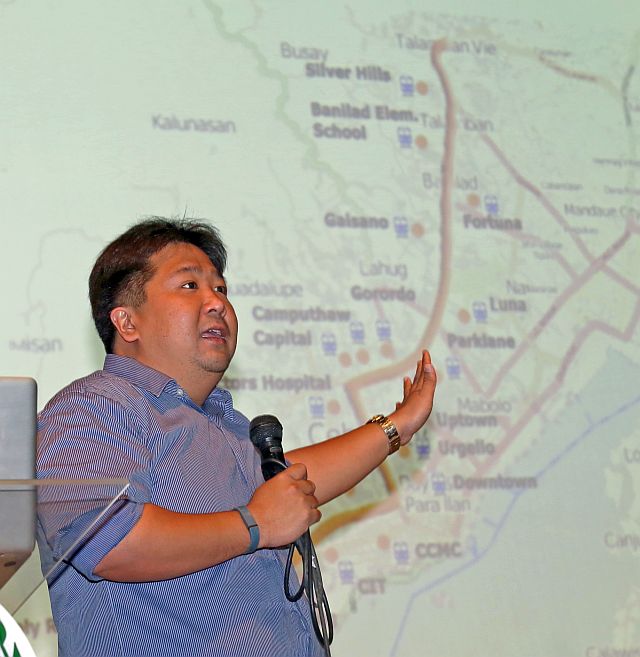Road right-of-way costs up for BRT

BRT project chief Rafael Yap shows the proposed route during a forum in this Jan. 21, 2016 file photo.
But project chief says it won’t hamper completion of project in 2019
Road right-of-way (RROW) cost for the Cebu Bus Rapid Transit (BRT) project is projected to increase from the previous estimate of P1.26 billion to a whopping P9.04 billion.
But BRT project chief Rafael Yap said the project will still continue as the national government, through the Department of Transportation (DOTr), will shoulder the amount.
“All funds for lot acquisition or road right-of-way will be for account of the national government,” Yap said in a report he sent to Cebu City Councilor Joel Garganera, who heads the Cebu City Council’s committee on transportation.
Yap said the increase of P7.77 billion in the RROW acquisition for the project is still an “indicative estimate” which means that it is not yet the final amount.
He said the amount is still undergoing validation as well.
Based on the report, the initial needed amount for RROW acquisition at the time the Cebu BRT project was proposed to the National Economic Development Authority (NEDA) board in 2012 amounted to P1,267,256,525.21.
This amount was broken down into land acquisition (P620.5 million), structure replacement cost (P499.9 million), resettlement development cost (P110.6 million) and income restoration (P36 million).
But based on updates earlier this year, it was found out that the project needed an estimated budget of P9,042,970,991.07.
Included in this bigger amount are land acquisition (P3.62 billion), structure replacement cost (P403.3 million), resettlement development cost (P59.4 million) and income restoration (P4.95 billion).
A copy of the DOTr report obtained by Cebu Daily News cited the passage of Republic Act 10752 or the act facilitating the acquisition of right-of-way site or location for government infrastructure projects in March 7, 2016 as the reason for the increase in costs.
Before the law was passed, Yap said budgeting for RROW acquisition of government projects was based on Republic Act 8974.
The law allowed the government to select between expropriation proceedings or negotiated sale as the method for acquiring RROW.
Negotiated sales use Fair Market Value (FMV) as basis for payment.
But this was difficult to base on since market values fluctuate very quickly.
This made government budgeting preparations done the previous year difficult, Yap said.
Zonal valuation, which was deemed more stable, was used for budgeting purposes.
But RA 10752, which retroactively applies to all government projects, requires government agencies to negotiate a sale with property owners before doing expropriation proceedings.
Another factor in the increase is the search for another area to be used as a depot site for the buses in the BRT project.
In the 2012 feasibility study, the Cebu City-owned Lot 27 in the North Reclamation Area was proposed as the bus depot site.
But both former mayor Michael Rama and now Mayor Tomas Osmeña said the lot cannot be used anymore.
The BRT project office located another property in Talisay City as a depot site which meant additional cost to the project.
The BRT is expected to be operational by early 2019.
Disclaimer: The comments uploaded on this site do not necessarily represent or reflect the views of management and owner of Cebudailynews. We reserve the right to exclude comments that we deem to be inconsistent with our editorial standards.
